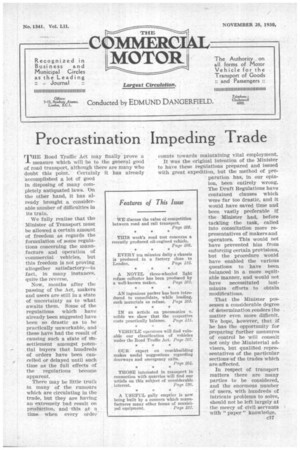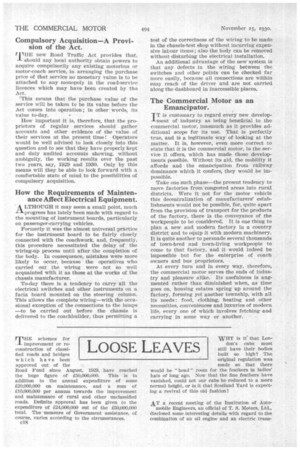Procrastination Impeding Trade
Page 39

Page 40

If you've noticed an error in this article please click here to report it so we can fix it.
THE Road Traffic Act may finally prove a measure which will be to the general good of road transport, although there are many who doubt this point. ' Certainly it has already 'accomplished a lot of good in disposing of many com pletely antiquated laws. 'On the other hand, it has already brought a considerable number of difficulties in its train.
We fully realize that the Minister of Transport must be allowed a certain amount of freedom as regards the formulation of some regulations concerning the manufacture and operation of commercial vehicles, but this freedom is not proving altogether satisfactory—in fact, in many instances, quite the reverse.
Now, months after the passing of the Act, makers and users are still in a state of uncertainty as to what awaits them. Some of the regulations which have already been suggested have been so drastic as to be practically unworkable, and these have had the result of causing such a state of tatsettlement amongst potential buyers that hundreds • of orders have been can , celled or delayed until such time as the full effects of the regulations become apparent.
There may be little truth in many of the rumours which are circulating in the trade, but they are having an extremely bad result on production, and this at a time when every order 5 counts towards maintaining vital employment. It was the original intention of the Minister to have these regulations prepared and issued with great expedition, but the method of preparation has, in our opinion, been entirely wrong. The Draft Regulations have contained clauses which were far too drastic, and it would have saved time and been vastly preferable if the Minister had, before tackling the task, called into consultation more representatives of Makers and operators. This would not have prevented him from enforcing certain provisions, but the procedure would have enabled the various questions to have been balanced in a more equitable manner, and would not have necessitated lastminute efforts to obtain modifications.
That the Minister possesses a considerable degree of determination renders the matter even more difficult. We hope, however, that if he has the opportunity for preparing further measures of control he will consult not only the Ministerial advisers, but qualified representatives of the particular sections of the trades which are affected.
In respect of transport matters there are many parties to be considered, and the enormous number of users, with hundreds of intricate problems to solve, should not be left largely at the mercy of civil servants with " paper " knowledge.
Compulsory Acquisition—A Provision of the Act.
HE new Road Traffic Act provides that, should any local authority obtain powers to acquire compulsorily any existing motorbus or motor-coach service, in arranging the purchase price of that service no monetary value is to be attached to any monopoly in the road-service licences. which may have been created by the Act.
This means that the purchase value of the service will be taken to be its value before the Act comes into operation ; in other words, its value to-day.
How important it is, therefore, that the proprietors of regular services should gather accounts and other evidence of the value of their services at the present time! Operators would be well advised to look closely into this question and to see that they have properly kept and duly audited accounts showing, without ambiguity, the working results over the past two years, say, 1929 and 1930. Only by this means will they be able to look forward with a comfortable state of mind to the possibilities of compulsory acquisition.
How the Requirements of Maintenance Affect Electrical Equipment.
ALTHOUGH it may seem a small point, much --progress has lately been made with regard to the mounting of instrument boards, particularly on passenger-carrying vehicles.
Formerly it was the almost universal practice for the instrument board to be fairly closely connected with the coachwork, and, frequently, this procedure necessitated the delay of the wiring-up process until after the completion of the body. In consequence, mistakes were more likely to occur, because the operatives who carried out the wiring were not so well acquainted with it as those at the works of the chassis manufacturer.
To-day there is a tendency to carry all the electrical switches and other instruments on a facia board mounted on the steering column. This allows the complete wiring—with the occasional exception of the connections to the lamps —to be carried out before the chassis is delivered to the coachbuilder, thus permitting a test of the correctness of the wiring to be made in the chassis-test shop without incurring expensive labour items ; also the body can be removed without disturbing the electrical installation.
An additional advantage of the new system is that any defects in the wiring between the switches and other points can be checked far more easily, because all connections are within easy reach of the driver and are not carried along the dashboard in inaccessible places.
The Commercial Motor as an Emancipator.
IT is customary to regard every new development of industry as being beneficial to the commercial motor, inasmuch as it provides additional scope for its use. That is perfectly true, and iS a legitimate way of looking at the matter. It Is, however, even more correct to state that it is the commercial motor, in the service it offers, which has made those developments possible. Without its aid, the mobility it affords and the emancipation from railway dominance which it confers, they would be impossible.
Take one such phase—the present tendency to move factories from congested areas into rural districts. Were it not for the motor vehicle this decentralization of manufacturers' establishments would not be possible, for, quite apart from the provision of transport for the products of the factory, there is the conveyance of the workpeople to be considered. it is one thing to plan a new and modern factory in a country district and to equip it With modern machinery. It is quite another to persuade several thousands of town-bred and town-living workpeople to come to that factory, and it would indeed be impossible but for the enterprise of coach owners and bus proprietors.
At every turn and in every way, therefore, the commercial motor serves the ends of industry and pleasure alike. Its usefulness is augmented rather than diminished when, as time goes on, housing estates spring up around the factory, forming yet another township, with all its needs: food, clothing, heating and other necessities, conveniences and luxuries of modern life, every one of which involves fetching and carrying in some way or another.












































































































